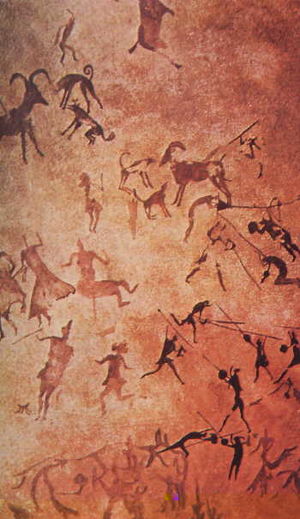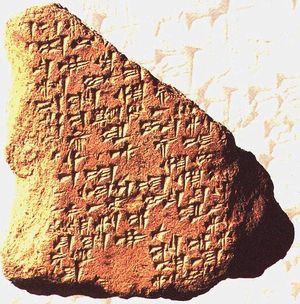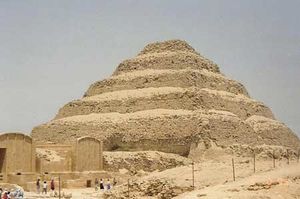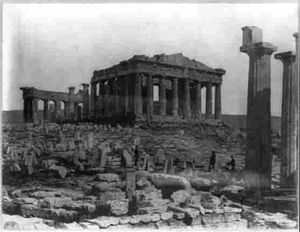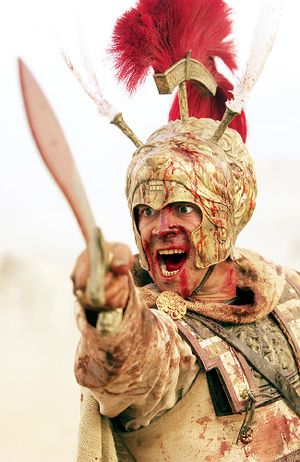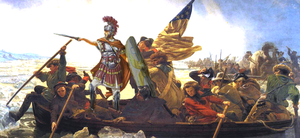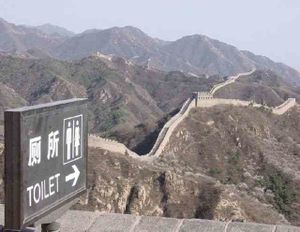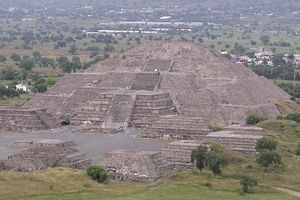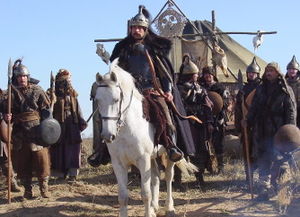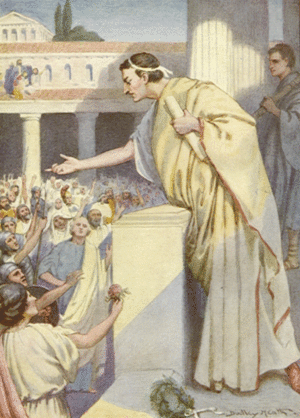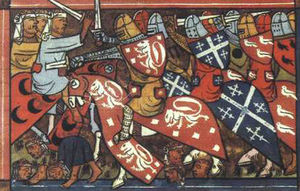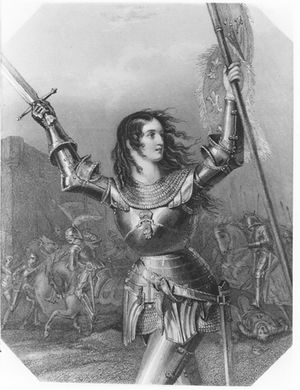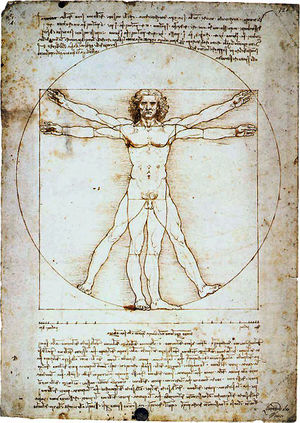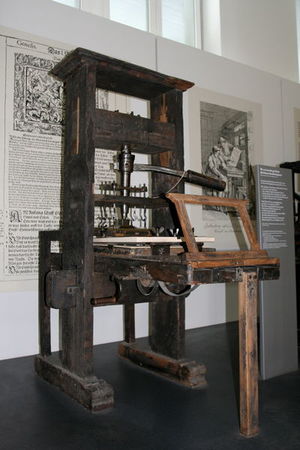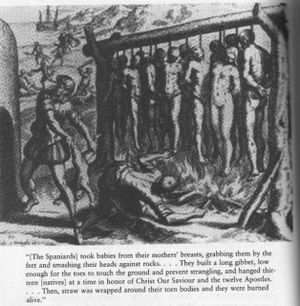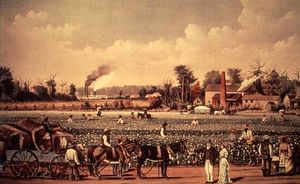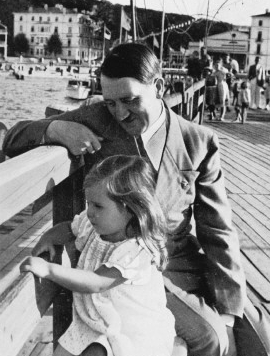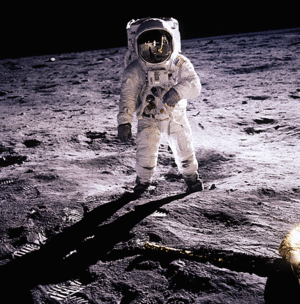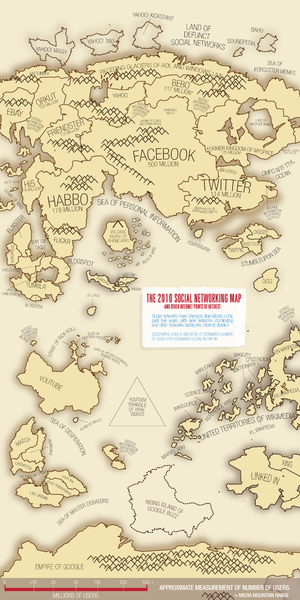History of the world
The history of the world or human history is the history of humanity from the earliest times to the present, in all places on Earth. Or in short, it's all about stuff that happened while there was someone around smart enough to notice that stuff was happening. At first they were iletterite, and passed their memories on using oral tradition, which disappointingly does not relate to the transference of information via oral sex.
Finally someone worked out how to read, and someone else worked out how to write, and recorded history was then born. History can also come from other sources such as archaeology, which involves digging stuff up and making up stories about it. Despite this being a recognised field of science, it is not suggested that you dig up deceased relatives and give them personalities created from your own psychosis.
Human history starts back with the early Stone Age – or the Paleolithic – known as such as that was the time mankind started using stone tools, not because they were regularly stoned. That had to wait until the Neolithic Era and the invention of agriculture (and beer!), thence the invention of animal husbandry.
The groups of humans grew larger and developed into city–states, and with that the start of civilisation in places like the Middle East's Mesopotamia. The growing complexity of human societies necessitated systems of mathematics, which led to writing, which then led to the internet, which is leading to the end of civilisation.[1]
The history of the Old World[2] (Europe in particular) is commonly divided into numerous periods. These are often referred to as days and years. The study of history is often about the recollection of dates of significance, such as the date you had your first kiss, or for males, the first time you got laid.
Prehistory
Hominids other than Homo sapiens, such as Homo erectus, may have been using simple tools for many millennia. As they had no power source other than the sun, however, their ability to make a power tool was somewhat limited. This of course meant that the invention of the vibrator was still some way beyond them, which explains why they had to remain erectus for so long.
At some point humans began using fire. While some suggest that this may have been for the purposes of heat or cooking, the possibility that they were using it as an early form of strobe lighting in late night raves cannot be conclusively dismissed.
They also developed language in the Palaeolithic period. This has often been seen as a bad move.
The Agricultural Revolution, beginning about 8,000 BCE, saw the development of agriculture. Farming permitted far denser populations, which was surprising as most of the population was fairly dense already.
Agriculture also created food surpluses which could support people not directly engaged in food production. As the majority of people up to this point had been in hunter–gatherer nomadic groups, this suddenly meant that the skills held by many became redundant, which increased unemployment levels. A dramatic need for retraining of the workforce was required, which in turn led to excessive student loans being required.
Due to the lack of banking facilities – predominantly due to the fact that there was no currency – these unskilled workers had no choice but to join a military unit. This led to leaders with more militaristic strength, with which they could now conquer the farmers. This is what is known as civilisation.
The development of cities was synonymous with the rise of civilization. Early civilizations arose first in lower Mesopotamia (3500 BCE). Each civilisation was so different from the others that they almost certainly originated independently. Writing and extensive trade developed to meet the needs of cities, which created the role of the travelling salesman. Due to the lack of telephones, it was a while before the role of the telemarketer appeared.
This period also saw the apparent origins of complex religion, as nothing says civilisation more than believing in nonsense. Religious belief in this period commonly consisted in the worship of a number of deities, including a supreme Goddess. Modern religions have moved beyond the belief in a primitive anthropomorphised deification, and are now much more rational and sane.[citation needed]
Antiquity
Cradles of civilization
The Bronze Age is part of the poorly named three-age system (Stone Age, Copper Age, Bronze Age, and Iron Age). It was during this age, in the 4th millennium BCE, that in places like Mesopotamia the city–states arose. It was in cities like these that the earliest known form of writing, cuneiform script, appeared c. 3000 BCE. This started off as pictures of people, animals and things in order to represent people, animals and things, and slowly became more stylised.
| Egyptian | Phoenician aleph |
Greek Alpha |
Etruscan A |
Roman/Cyrillic A |
|---|---|---|---|---|

|

|

|
This change in stylisation was an indicator that style was, and still is, often considered more important than substance. In many ways this is a trend that continues today, where Justin Bieber can resemble a singer in much the same way the dismembered head of an ox can resemble the letter A.
This happened in several places at the same time but became stylised in different ways. This meant that different places created different written languages as they became more civilised. This reflects that having more differences among cultures and people is a sign of advanced civilisation.
This era also saw new land technologies, such as horse-based cavalry and chariots, which allowed armies to move faster. These developments led to the age of empires.[3]
Axial Age
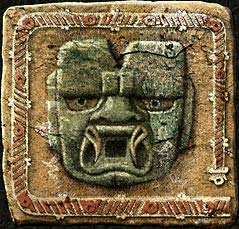
The next great breakthrough in Western civilization was the glorious civilization of Ancient Greece, the inventor of philosophy, music, sculpture, athletics, Greek love, lesbianism, ouzo, goat cheese, democracy and My Big Fat Greek Wedding. Many sporting events were done nude, along with sculpture and art. While the Greeks did make significant changes in the rise of civilisation, they appeared to not have quite understood the concept of clothing at the time.
The Iliad and The Odyssey, written in the 9th century BCE, was filled with great action scenes and not an insubstantial amount of gay love. The plot, chronicling the epic conflict between two major condom manufacturers, centres on Achilles: a warrior who narrowly escaped being charbroiled and eaten by his mother Thetis, then ran away to become immortal for boning and kicking Trojan butt.
Homer, the greatest poet in history until Dr. Seuss, was only one of Greece's many major intellectual figures, because Greece was bustling with brainy dudes wearing robes and sandals who did nothing for a living. This led to the rise of philosophers like Socrates, Pythagoras and Aristotle, who also did nothing but did so with more style than others.
Greece was actually many city–states, such as Sparta and Moscow, but the one that gained the most fame was Athens, the first place where guys with long beards and no visible means of support could enjoy being in the in-crowd. From this city came the beginnings of democracy in 507 B.C. under Cleisthenes, who spearheaded a revolt against dictatorship, not for himself alone but "in partnership with the people". Athenian Democracy was a new form of government far superior to any that had come before it, as it allowed for the people, namely voting citizens, to have a say in governmental affairs – excluding of course women, slaves, the poor, Jews, blacks, aliens, and those resisting the sexual advances of aristocrats.
It works by locking the voters in a room together until they find a topic they disagree over, then argue about it for weeks without resolution until they get tired and go home.[4] This replaces the long history of monarchs who can make instant decisions that cost thousands of lives with a new system that accomplishes nothing and retains the status quo.
Regional empires
The millennium from 500 BCE to 500 CE saw a series of empires of unprecedented size develop. This has been attributed to numerous reasons – the increasing reliability of information due to writing, and the highly developed ethos of philosophical and religious entities – but predominantly the fact that some bugger had a bigger army than some other poor bugger.
The rise of these empires saw a rise in the need for a strong bureaucracy which resisted change to support a rule based down through familial bonds. This meant that bureaucrats needed to do nothing significant to be successful, and the ruling families relied more and more upon inbreeding to keep the seat of power.
The costs of maintaining this fell most heavily on the peasantry, while land-owning magnates increasingly evaded centralised control and its costs. The ruling 1% thereby took what they could from the remaining 99%, regardless of the damage this was doing to their own country. Of course this type of empire, while common in ancient history, could never exist in the enlightened times of today.[citation needed]
Europe
Athenian democracy did not last, as by 340 B.C. Philip II of Macedonia had swept through, crushing the city–states and unifying them into one collective nation. However, in 336 B.C., just as he was getting somewhere, he was killed over a misunderstanding at a Tupperware party.
Enter his son and heir Alexander the Great. Tutored by Aristotle from birth, Alexander was renowned by the age of 18 for his desire to bone his mother and for his boundless ego. This was possibly caused by Aristotle's pumping him while telling him he was "probably the son of Zeus" at age 8. Unfortunately, he was a flagrant imbecile, and decided after a night of drunken partying to burn down the recently captured Persepolis, a city containing the ancient world's finest architecture.
On June 11, 323 B.C., while trying to round up an army to invade India, Alexander croaked of malaria in the foul town of Baghdad, leaving no heir to take over his sprawling empire.
While Greece floundered, Rome was steadily building up its own empire. They had gotten off to a slow start, but since this was ancient history they could take all the time they wanted.
At first satisfied with their seven shitty hills, the Romans eventually decided to strike out and build the Roman Empire. A few hundred years later Julius Caesar became the man, popular not only with aristocrats but with commoners for inventing the Caesar Salad and the Caesarean Section so that thin runway models could have children too, and all those fat women could be dispensed with.
This later led to Roman soldiers' becoming weak skinny wimps who were no match for the German and other barbarians, further proving that every silver lining has a cloud.
Around this time Rome's greatest writer Virgil was born. In the ancient world, based on the Greek example, everyone who was unemployed was either a philosopher or a poet and, as philosophers still had to teach two classes a week at the Academy, Virgil decided to become a poet. The Aeneid, his magnum opus, was shamelessly plagiarised from The Iliad, for which God sent him to Hell, where he was put in charge of giving tours of the Underworld, as documented in Dante's Inferno, where he became famous for the sound bite that he thought Satan would look "scarier in person".
The all-too-brief march of ideas enjoyed under Julius Caesar was abruptly ended on the Ides of March in 44 B.C., when Brutus and a bunch of other jealous senators assassinated him, leading to the division of Rome into two parts by a pair of wannabe Caesars, Marc Antony and Octavian. This proved that the best way to cut something up is by using a pair of Caesars.
Asia
Meanwhile, the Han Dynasty is often considered to be the Rome of China. One of the major differences, however, is while Rome was built using the best parts of the cultures they assimilated, Han did it solo.
Another major difference was that Han China was developing advanced cartography, shipbuilding, and navigation as opposed to military might. The East developed blast furnaces, and the capacity to create finely tuned copper instruments. One of the technological drawbacks they had, however, was their abundant love of tea. Han China focused on making nicer ceramic cups while the West worked on making beer glasses. This resulted in China's being focused on fine china, and not learning the arts of working with glass – which meant they had no spectacles, telescopes, microscopes or windows. Had they reflected on this – alas, no mirrors either.
Meanwhile, in 300 BCE, South Asia was united into the Maurya Empire by Chandragupta Maurya and flourished under Ashoka the Great. From the 3rd century CE, the Gupta dynasty oversaw the period referred to as ancient India's Golden Age. Empires in Southern India included those of the Chalukyas, the Rashtrakutas, the Hoysalas, the Cholas and the Vijayanagara Empire.
The Americas
In Central America vast societies were built, the most notable being the Maya and Aztecs of Mesoamerica. However, these empires, along with the Incan empire, had all but died out by the time white settlers came to America, and as such are not important.
Declines and falls
The great empires of Eurasia were all located on temperate coastal plains. From the Central Asian steppes, horse-based nomads (Mongols) dominated a large part of the continent. Which shows that you can be a complete mongoloid and as long as you're stronger than the other guy; you're still likely to end up on top.
China's Han Empire fell into civil war in 220 CE, thus proving that while discovery and learning are a good thing it doesn't help much when dealing with a Mongol archer, no matter how big you build a wall. After the fall of the Han Dynasty nomadic tribes from the north began to invade. The Sui Dynasty reunified China in 581, and under the succeeding Tang Dynasty (618–907) China entered a second golden age, but not quite as golden – more a wee yellow age.
Yet pressure from nomadic empires to the north became increasingly urgent, and the Mongol Empire conquered all of China in 1279. Again proving the dominance of strength over geekiness.
As the Roman Empire's power and influence weakened in the 5th century, it quickly became the place for barbarians on the make to hang out and pillage. This was made easier due to Rome's border security and tourism ministry, which determined that all roads should lead to Rome. However, after a particularly bad summer when Rome was sacked several hundred times by Huns, Visigoths and Ostrogoths (who are the Goths who prefer to ravage cities looking for Astros tickets), the Germanic Visigoth chieftain Odoacer forced the last Roman emperor in the West, Romulus Augustus, to abdicate, in return for a pension and lots of young boys.
Accepting a permanent shift in the powers-that-be, the Roman Catholic Church, now the largest support group in the world, held a board meeting in Rome. There it was decided that, in light of the new Northern European supremacy, they would kiss foreign butts of state,[5] while simultaneously dispatching missionaries to their homelands in the hope of converting them to their superstition. A superstition that suggests paradise is obtained by giving all your money to the church, by which the church could recoup much of the capital they had invested in sustaining a slipshod Roman economy.
Much to the delight of the Southern European popes, the campaign to culturally assimilate Northern Europe proved wildly successful, so much so that the term "barbarian" adopted in the West as a pejorative term to describe someone who lacks manners – or, alternatively, someone who cuts hair. The barbarians, who had previously been responsible for the destruction of the Roman Empire, would spend the better part of the next two thousand years attempting to recreate it in London, Paris, Moscow and Berlin.
In these times Northern India was ruled by the Guptas. In southern India three prominent Dravidian kingdoms emerged: Cheras, Cholas and Pandyas. Unfortunately, nobody cares.
Middle Ages
The Middle Ages are commonly dated from the end of fall of the Western Roman Empire in the 5th century, or the start of the summer. The Middle Ages were one of the most progressive times in human history, not just because they had really nifty stuff like knights, dungeons, and dragons, but also because several different remarkably innovative concepts were pioneered during this time, including crop rotation, iron-rich diets, and heavy ploughs. The more iron rich the diet, the heavier the plough.
The knowledge and skills of the ancient Middle East, of Greece and of Persia were learned by Muslims in the Middle Ages. Fundamentalist Muslims have since condemned the West for introducing corruption into their culture, which shows that civilisation is generally synonymous with decadence.
Several remarkable battles occurred during the Middle Ages including, perhaps most notably of all, the Crusades, which lead to a Western European victory in 1099 with the capture of Jerusalem, only to face the hard fact that the entire area is run by Muslims and they will eventually reconquer it.[6]
After the Muslim victory a new crop of Crusaders in 1145 A.D. were talked into a lamer effort with the promise of a helmet with a fancy cross on it, marching off to kick Muslim butt and rape Muslim women,[7] crossing through Spain to the Holy City of Jerusalem, where capturing the Holy Tomb of Christ was supposed to be worth it. In 1187 A.D. Saladin recaptured the Holy Land, granting clemency to the Christian army and their families so they could go back to Europe and tell people that it wasn't worth it.
Subsequently, the most highly respected thinkers in all of Western Europe held a conference, and decided that if their adult armies could not defeat the Muslims, surely armies comprised entirely of children could. The several thousand children sent to fight in the Children's Crusade were all captured long before their arrival in the Middle East, and sent to work as slaves in Africa, later inventing basketball.
Another conflict worthy of mention is the one involving Joan of Arc, the Hundred Years' War.[8]
At the impressionable age of thirteen, Joan began hearing voices which she attributed to God and his angels, not dissociative identity disorder caused by her paedophile daddy sneaking in at night. The voices told her to go to a nearby church, and therein beneath the altar find a sword. Sure enough, as knights at the time would leave swords as offerings, she found a sword, thus proving herself a miraculous prophet who would lead armies to the ultimate victory of France.
When commanding her soldiers Joan went by the unassuming title of "She Who Was Asked By God To Go And Conquer France". She led her men to several great victories before being reminded that she was French, after which she promptly surrendered to the British, who proceeded to try her as a witch for dressing like Madonna on the Virgin Tour.
The Catholic church instituted the Medieval Inquisition around 1200. This was done by torturing and killing thousands of their own subjects and seizing their assets for the good of the Church. These subjects were all found guilty by various forensic methodology like trial by fire, trial by dunking, and trial by methods that would make even a guard at Guatanamo sit up and say "That's a bit rough."
Modern history
Early Modern period
The Early Modern period is that period following the Middle Ages, which in turn is defined as the period of time before the early modern period. It is difficult to define in dates when one period of history ceases and another begins, as historians dispute the dates that define periods, and different periods of history start in different places in different parts of the planet. This is most evident when a citizen of North America travels to Texas, and suddenly realises they've stepped back in time about fifty years.[9]
Renaissance
In the beginning of the 14th century Europe underwent a state of change that is now referred to as a "Renaissance". This word comes from the Latin word meaning to be reborn. The basic premise of this is that things were better in the old days, and people should start learning from the lessons of the past. In short, they discovered that most of the last seven hundred years was a pretty terrible time, and they tried to set the clock back again – like a cultural snooze button.
The renaissance originally consisted of the rediscovery of the classical world's scientific contributions. So the early renaissance men were in fact plagiarists of long dead Roman scholars, who plagiarised the Greek scholars, who had plagiarised the Indian scholars. In short, nobody was coming up with anything new.
Although it saw social and political upheaval and revolutions in many intellectual pursuits, the Renaissance is perhaps known best for its artistic developments and the contributions of such polymaths as Leonardo da Vinci and Michelangelo, because at least they were coming up with new ideas.
Leonardo da Vinci also came up with numerous inventions, such as the helicopter (which didn't work) and gunpowder (which he stole from the Chinese). Many of his inventions were lost for centuries, until they were in turn plagiarised by Thomas Edison.
In 1478 the Spanish Inquisition began. This was actually a ploy by the Spanish monarchy to better their fledgling financial situation by killing Jews and Muslims (whose lives everyone knows are expendable) and confiscating their assets, as they were generally more wealthy than most Spaniards who already gave a tithe to the church. In this regard, the Inquisition could be viewed in much the same light as the modern War on Terror, but less sadistic.
Rise of Europe
European powers came to dominate most of the world. There are numerous theories as to why this happened. Some say it was due to geographical advantages; some say it was relating the ethnic differences, or differences of power structures, or even a remnant of the fall of the Roman Empire, which left a power vacuum that the church and various other political structures then filled. However, what all these theories miss is the obvious truth: that the Europeans were just too cool for the rest of the world to stand a chance.
History did continue to happen in other parts of the world though. Before the era of firearms, the Mongols were a militarily superior force. If they broke out into the plains of northern India or the valleys of China, they were all but unstoppable. The Golden Age of Islam was ended by the Mongol sack of Baghdad in 1258. India and China were subject to periodic invasions, and Russia spent a couple centuries under the Mongol-Tatar yoke, which refused to budge even after the most vigorous of brushing.
By about 1500 there was a qualitative change in world history. Technological advance and the wealth generated by trade gradually brought about a widening of possibilities. It was the expansion of mercantile empires, fueled by capitalism, that fostered the growth of empires.
Fortunately no enlightened country of today would ever consider invading another countries sovereign state on a flimsy pretense for the primary purpose of controlling a larger natural resource supply.[citation needed]
This era in European culture saw the Age of Enlightenment which led to the Scientific Revolution. Since this period science has constantly been revolting.
The Portuguese government asked the Catholic church if they could have their own inquisition in 1515. This way they could get the same benefits the Spanish monarchy were getting, but with Papal blessing. Papal blessing is much like purchasing from a brand's official website instead of through eBay.
Late modern period
Revolting science (also known as scientific revolution) led to the Industrial Revolution. This began in Great Britain and used new modes of production – the factory, mass production, and mechanisation – to manufacture a wide array of goods. This led to the demoralisation and dehumanisation of the workforce. This was such a revelation in effective managerial techniques that by the late 16th century profits from the slave trade amounted to five percent of the British economy.
European expansion infiltrated almost every corner of the globe including Asia, India, and Africa. The Americas, Australia and New Zealand were discovered as bright shining new lands that were ripe for settling, which came as a surprise to the people who had settled there for millennia already.
The desire for expansion was so great that the French decided to expand to take over France, which lead to a revolution. The European Americans saw how well that was working for them and decided to do the same. The American revolutionaries won their battle, which finally gave freedom to all Americans, so they could take part in the riches that were there for the taking in the African slave trade.
Inspired by the success of previous inquisitions, the Catholic Church relaunched its own inquisition in 1623 as "Congregation of the Holy Office of the Inquisition", because if you're going to torture old ladies and say they are witches you need an official sounding title.
Contemporary history
1900 to 1945
The 20th century opened with Europe at an apex of wealth and power, and with much of the world under its direct colonial control or its indirect domination. This was a time of peace and prosperity, when all the world was joined together in the bonds of fraternal feeling and the concepts of liberty and equality were felt worldwide.
As with any fraternal relationship, sibling rivalry followed hot on its heels. In 1914, an archduke was murdered, which led to treaty after treaty being enacted. Like falling dominoes, much of the world entered into a war of a scale never before seen.
This lasted until 1919, when peace finally broke out and the war to end all wars ceased. New boundaries were created, treaties were signed, and the League of Nations was formed, ensuring a war of this scale would never happen again. The world was suddenly a very different place, and the time of the European Empires came to a grinding halt. The Russians, seeing how well the Americans had done,[10] decided to have a revolution of their own. This was a mixed success, where the ideals of communism became a reality, but at the same time the reality of communism became a reality.
National pride was everywhere, and fascist and socialist regimes started to crop up in places like Italy and Germany– but of course these were no real global threat, what with all those treaties in place.
1945 to 2000
The United Nations was founded in 1945. Its goal was to allay conflicts among nations and prevent future wars. This was based upon the previous League of Nations that was put in place to avoid the Second World War, giving its likelihood of success much the same as a mouse trying to mount a lion.
After an aborted[11] attempt to change their image earlier in the century, the Catholic Inquisition continued until 1965, when it became the "Congregation for the Doctrine of the Faith", which was not as concerned about witches but public relations. The previous head of the CDF, as they are commonly called, was instrumental in setting up the church practices relating to paedophilia.[12] He was forced to relinquish his position as the head of the CDF when he was appointed the role of Pope in 2005.
At this stage the two major national powers were the United States and Soviet Russia. There was a significant level of distrust between the two nations, but due to the proliferation of weapons of mass destruction they did not engage in war against each other directly. Instead they circled around each other like two cats, unsure if they were going to fight or procreate.
Instead of a direct war, America chose to arm and train other countries in an effort to destabilise the Soviet menace. This included the extremely wise choice of supporting, arming, and training Iraqi leader Saddam Hussein, and arming and training Afghanistan freedom fighters like Osama bin Laden.
In hindsight, this may have been a mistake.
21st century
Technological breakthroughs finally tapped an energy source too cheap to meter. The hover car and jet pack – and later the teleporter – made travel easier and broke down geopolitical boundaries. International understanding was reached as translation devices allowed all people to share ideals like universal healthcare, liberty, the pursuit of happiness...[13]
Notes
- ↑ "Conservapedia". Conservapedia. http://www.conservapedia.com. Retrieved 2012-12-20.
- ↑ The one we left when the aliens brought us to this one.
- ↑ This has been hotly debated, as empirical evidence is hard to come by.
- ↑ This is a proven effective method of reaching a community consensus and establishing the truth, such as the innocence of OJ Simpson and the viability of climate change science.
- ↑ Butts of state are similar to heads of state, but at a lower altitude. The fragrance is not too dissimilar though.
- ↑ This is obviously not the case in Afghanistan. Really.
- ↑ Kicking Muslim butt and raping Muslim women is now considered to be the national sport of the United States.
- ↑ As a sign of advanced mathematical skill, the Hundred years war actually raged over 116 years, although some years were more rageworthy than others.
- ↑ For an Australian, think of Western Australia. For a European, think Belgium. For an African... you're pretty much buggered.
- ↑ The European descent Americans, that is. Native Americans and African Americans don't count.
- ↑ Don't use that word!
- ↑ Often cited as the inspiration for the US Armies "Don't ask, don't tell" policy.
- ↑ If you could make up your own history of the world, wouldn't you want it to end this way?


